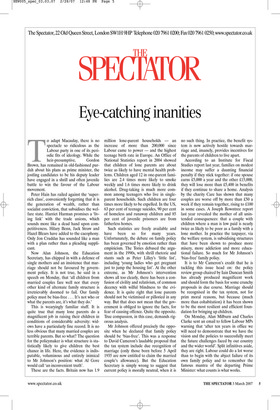Eye-catching inanities
To adapt Macaulay, there is no spectacle so ridiculous as the Labour party in one of its periodic fits of ideology. While the heir-presumptive, Gordon Brown, has remained in old-fashioned purdah about his plans as prime minister, the jostling candidates to be his deputy leader have engaged in a shrill and often juvenile battle to win the favour of the Labour movement.
Peter Hain has railed against the ‘superrich class’, conveniently forgetting that it is the generation of wealth, rather than socialist conviction, that subsidises the welfare state. Harriet Harman promises a ‘living link’ with the trade unions, which sounds more like a dead hand upon competitiveness. Hilary Benn, Jack Straw and Hazel Blears have added to the cacophony. Only Jon Cruddas has sounded like a man with a plan rather than a pleading supplicant.
Now Alan Johnson, the Education Secretary, has chipped in with a defence of single mothers and an insistence that marriage should not be favoured by government policy. It is not true, he said in a speech on Monday, that ‘all children from married couples fare well nor that every other kind of alternate family structure is irretrievably doomed to fail. Our family policy must be bias-free ... It’s not who or what the parents are, it’s what they do.’ This is wearyingly familiar stuff. It is quite true that many lone parents do a magnificent job in raising their children in conditions of considerable adversity: widows have a particularly fine record. It is no less obvious that many married couples are terrible parents. But so what? The question for the policymaker is what structure is statistically likely to give children the best chance in life. Here, the evidence is indisputable, voluminous and entirely inimical to Mr Johnson’s position: what Al Gore would call ‘an inconvenient truth’.
These are the facts. Britain now has 1.9 million lone-parent households — an increase of more than 200,000 since Labour came to power — and the highest teenage birth rate in Europe. An Office of National Statistics report in 2004 showed that children of lone parents are about twice as likely to have mental health problems. Children aged 12 in one-parent families are 2.4 times more likely to smoke weekly and 1.6 times more likely to drink alcohol. Drug-taking is much more common among teenagers who live in singleparent households. Such children are four times more likely to be expelled. In the US, 63 per cent of teenage suicides, 90 per cent of homeless and runaway children and 85 per cent of juvenile prisoners are from fatherless homes.
Such statistics are freely available and have been so for many years. Unfortunately, the debate on family policy has been governed by emotion rather than empiricism. The Tories debased the argument in the 1990s, with shrill rhetoric and stunts such as Peter Lilley’s ‘little list’, including ‘young ladies who get pregnant just to jump the housing list’. At the other extreme, as Mr Johnson’s intervention shows all too clearly, there has been a confusion of civility and relativism, of common decency with wilful blindness to the evidence. It is quite right that lone parents should not be victimised or pilloried in any way. But that does not mean that the government is obliged to ignore the facts, for fear of causing offence. Quite the opposite. True compassion, in this case, demands rigorous analysis.
Mr Johnson offered precisely the opposite when he declared that family policy should be ‘bias-free’. This was a response to David Cameron’s laudable proposal that the tax system include due recognition of marriage (only those born before 5 April 1935 are now entitled to claim the married couple’s allowance). But the Education Secretary is simply wrong to suggest that current policy is morally neutral, when it is no such thing. In practice, the benefit system is now actively hostile towards marriage and, insanely, provides incentives for the parents of children to live apart.
According to an Institute for Fiscal Studies report last year, families on modest income may suffer a daunting financial penalty if they stick together: if one spouse earns £5,000 a year and the other £15,000, they will lose more than £5,400 in benefits if they continue to share a home. Analysis by the charity Care has shown that many couples are worse off by more than £50 a week if they remain together, rising to £100 in some cases. A Joseph Rowntree report last year revealed the mother of all unintended consequences: that a couple with children where a man is low paid is nearly twice as likely to be poor as a family with a lone mother. In practice the taxpayer, via the welfare system, is subsidising structures that have been shown to produce more misery, more addiction and more educational failure. So much for Mr Johnson’s ‘bias-free’ family policy.
It is to Mr Cameron’s credit that he is tackling this issue head on: the policy review group chaired by Iain Duncan Smith has already produced magnificent work and should form the basis for some crunchy proposals in due course. Marriage should be recognised in the tax system, not for prim moral reasons, but because (much more than cohabitation) it has been shown to be the most resilient and efficient foundation for bringing up children.
On Monday, Alan Milburn and Charles Clarke sent an email to fellow Labour MPs warning that ‘after ten years in office we will need to demonstrate that we have the vision and the policies to successfully meet the future challenges faced by our country and the wider world’. Split infinitives aside, they are right. Labour could do a lot worse than to begin with the abject failure of its own family policy and to remember the famous mantra of the departing Prime Minister: what counts is what works.










































































 Previous page
Previous page